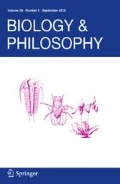Abstract
Koonin, in an article in this issue, claims that CRISPR–Cas systems are mechanisms for the inheritance of acquired adaptive characteristics, and that the operation of such systems comprises a “Lamarckian mode of evolution.” We argue that viewing the CRISPR–Cas mechanism as facilitating a form of “directed mutation” more accurately represents how the system behaves and the history of neoDarwinian thinking, and is to be preferred.


Similar content being viewed by others
References
Barrangou R, Fremaux C, Deveau H et al (2007) CRISPR provides acquired resistance against viruses in prokaryotes. Science 315:1709–1712. https://doi.org/10.1126/science.1138140
Beatty J (2006) Chance variation: Darwin on orchids. Philos Sci 73:629–641. https://doi.org/10.1086/518332
Beatty J (2016) The creativity of natural selection? Part I: Darwin, Darwinism, and the mutationists. J Hist Biol 49:659–684. https://doi.org/10.1007/s10739-016-9456-5
Beisson J, Sonneborn TM (1965) Cytoplasmic inheritance of the organization of the cell cortex in Paramecium aurelia. Proc Natl Acad Sci USA 53:275–282
Burkhardt RW (2013) Lamarck, evolution, and the inheritance of acquired characters. Genetics 194:793–805. https://doi.org/10.1534/genetics.113.151852
Cairns J, Overbaugh J, Miller S (1988) The origin of mutants. Nature 335:142–145. https://doi.org/10.1038/335142a0
Deichmann U (2016) Epigenetics: the origins and evolution of a fashionable topic. Dev Biol 416:249–254. https://doi.org/10.1016/j.ydbio.2016.06.005
Gissis S, Jablonka E (2011) Transformations of Lamarckism: from subtle fluids to molecular biology. MIT Press, Cambridge
Gould SJ (1977) Ever since Darwin: reflections in natural history. Norton, New York
Griffith F (1928) The significance of pneumococcal types. J Hyg (Lond) 27:113–159
Haag KL (2018) Holobionts and their hologenomes: evolution with mixed modes of inheritance. Genet Mol Biol 41:189–197. https://doi.org/10.1590/1678-4685-gmb-2017-0070
Heard E, Martienssen RA (2014) Transgenerational epigenetic inheritance: myths and mechanisms. Cell 157:95–109. https://doi.org/10.1016/j.cell.2014.02.045
Holliday R, Pugh JE (1975) DNA modification mechanisms and gene activity during development. Science 187:226–232
Hutchison CA, Phillips S, Edgell MH et al (1978) Mutagenesis at a specific position in a DNA sequence. J Biol Chem 253:6551–6560
Koonin EV (2018) CRISPR: a new principle of genome engineering linked to conceptual shifts in evolutionary biology. Biol Philos. https://doi.org/10.1007/s10539-018-9658-7
Koonin EV, Wolf YI (2016) Just how Lamarckian is CRISPR–Cas immunity: the continuum of evolvability mechanisms. Biol Direct 11:9. https://doi.org/10.1186/s13062-016-0111-z
Lawrence JG, Ochman H (1998) Molecular archaeology of the Escherichia coli genome. Proc Natl Acad Sci USA 95:9413–9417
Lennox JG (2010) The Darwin/Gray correspondence 1857–1869: an intelligent discussion about chance and design. Perspect Sci 18:456–479. https://doi.org/10.1162/POSC_a_00018
Levinson G, Gutman GA (1987) High frequencies of short frameshifts in poly-CA/TG tandem repeats borne by bacteriophage M13 in Escherichia coli K-12. Nucleic Acids Res 15:5323–5338
Martin WF (2017) Too much eukaryote LGT. BioEssays 39:1700115. https://doi.org/10.1002/bies.201700115
Martin WF (2018) Eukaryote lateral gene transfer is Lamarckian. Nat Ecol Evol 2:754. https://doi.org/10.1038/s41559-018-0521-7
Nei M (2013) Mutation-driven evolution. Oxford University Press, Oxford
Penny D (2015) Epigenetics, Darwin, and Lamarck. Genome Biol Evol 7:1758–1760. https://doi.org/10.1093/gbe/evv107
Rosenberg SM (2001) Evolving responsively: adaptive mutation. Nat Rev Genet 2:504–515. https://doi.org/10.1038/35080556
Shapiro JA (1984) Observations on the formation of clones containing araB-lacZ cistron fusions. Mol Gen Genet 194:79–90
Stoltzfus A, Cable K (2014) Mendelian-mutationism: the forgotten evolutionary synthesis. J Hist Biol 47:501–546. https://doi.org/10.1007/s10739-014-9383-2
Weiss A (2015) Lamarckian illusions. Trends Ecol Evol 30:566–568. https://doi.org/10.1016/j.tree.2015.08.003
Acknowledgements
Funding was provided by Natural Sciences and Engineering Research Council of Canada (Grant No. GLDSU447989).
Author information
Authors and Affiliations
Corresponding author
Additional information
Publisher's Note
Springer Nature remains neutral with regard to jurisdictional claims in published maps and institutional affiliations.
Rights and permissions
About this article
Cite this article
Wideman, J.G., Inkpen, S.A., Doolittle, W.F. et al. Mutationism, not Lamarckism, captures the novelty of CRISPR–Cas. Biol Philos 34, 12 (2019). https://doi.org/10.1007/s10539-018-9659-6
Received:
Accepted:
Published:
DOI: https://doi.org/10.1007/s10539-018-9659-6



